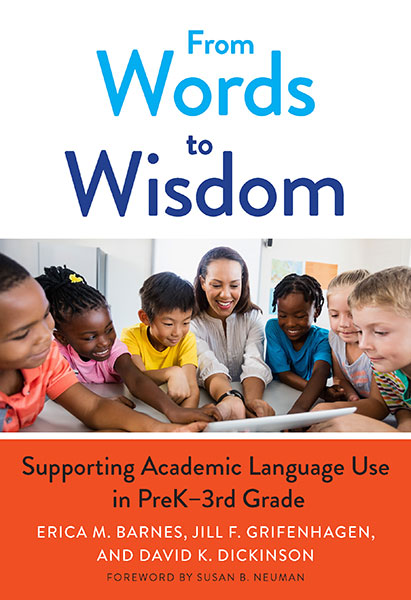Professors: Request an Exam Copy
Print copies available for US orders only. For orders outside the US, see our international distributors.
Erica M. Barnes, Jill F. Grifenhagen, David K. Dickinson
Foreword by: Susan B. Neuman
Publication Date: October 8, 2021
Pages: 176
Series: Language and Literacy Series

This practical guide shows teachers how to introduce academic language to young children, with an emphasis on appreciating and leveraging linguistic diversity. New educational standards are asking students to master content-area concepts and increasingly complex texts in earlier grades. This practitioner-friendly text provides instructional materials, sample dialogues, and assessment tools to facilitate academic language use in PreK–3 classrooms. The authors describe the word, sentence, and discourse levels of academic language, while encouraging teachers and students to consider purpose, participants, discipline, and context. Strategies are provided to help readers adapt language for a variety of academic purposes across mathematics, science, play, mealtimes, and ELA instruction. The text includes discussion questions, reproducible activities, planning materials, assessment tools, and handouts to facilitate smooth implementation into classroom practice. From Words to Wisdom will empower teachers to build bridges to academic success for all young learners.
Book Features:
Erica M. Barnes is an associate professor in the Department of Literacy Teaching and Learning at the University of Albany and a former teacher, teacher consultant, and progress monitoring specialist. Jill F. Grifenhagen is an assistant professor of literacy education at North Carolina State University and a former early elementary classroom teacher and instructional coach. David K. Dickinson is professor emeritus at Vanderbilt University’s Peabody College.
“As the authors point out, mastery of academic language leads children to better comprehension and composition of complex text. Starting early builds a strong foundation. Any teachers who want to be among the foundation builders would greatly benefit from reading this inspiring book!”
—Illinois Reading Council Journal
“By making a case for academic language, these authors are helping us all open a gateway for children to become members of a language community highly valued in school learning. It may become one of the most prized assets that we can give to our young children.”
—From the Foreword by Susan B. Neuman, professor of childhood and literacy education, New York University
“This book should be required reading for all teachers so that all children are provided with high-quality classroom language environments that ensure their future success. It is packed full of strategies and activities for integrating academic language throughout the school day. With thoughtful guidance for instruction across subject areas, teachers will learn to identify, model, and explicitly teach academic language. As a developmental psychologist who works with children from linguistically diverse backgrounds, I appreciated the real-world examples of classroom-based academic language used with young children—a testament that teachers have the power to build classrooms that support academic language across a variety of settings.”
—Perla B. Gámez, associate professor, Loyola University Chicago
Contents
Foreword Susan B. Neuman ix
Preface: Learning the Language of School xii
Acknowledgments xvii
1. An Overview of Academic Language 1
Academic or Casual Language? 1
How Might Academic Language Look in Early Childhood Classrooms? 4
Conclusion 9
2. Language Learning 10
Principles of Language Learning 10
Facilitating Language 13
Conclusion 17
3. Linguistic Diversity and Registers 18
The Academic Register 18
Teaching Linguistically Diverse Students 23
Celebrating Linguistic Diversity While Fostering Academic Language Development 25
Conclusion 29
4. Academic Vocabulary 30
Selecting Words to Teach 32
Teaching Academic Vocabulary 35
Conclusion 40
5. Complex Syntax 41
Coauthored by Katherine Newman
Development of Complex Syntax 42
Common Syntactic Structures 42
Complex Syntax in Academic Texts 45
Modeling and Instructing 46
Conclusion 52
6. Academic Discourse 53
Features of Academic Discourse 53
Academic Discourse in Early Childhood Classrooms 56
Conclusion 66
7. Mealtimes and Sharing Time 67
Mealtimes 68
Sharing Time 74
Conclusion 79
8. Playful Learning 80
Coauthored by Katherine Newman and Jessica Lawson-Adams
Drama and Imaginative Play 80
Games 83
Music 85
Conclusion 91
9. Scientific Language 92
What Is Scientific Language? 92
Teaching Scientific Vocabulary 94
Pulling It All Together 100
Conclusion 102
10. Mathematical Language 103
What Is Mathematic Language? 103
Modeling Mathematical Language Through Reads-Alouds 104
Teaching Mathematical Vocabulary 106
Mathematical Discourse 109
Conclusion 113
11. Assessment 114
Principles of Language Assessment 114
Informal Assessments 116
Formal Assessments 119
Assessing Classroom Support 119
Conclusion 122
Appendix A. Observing Academic Language in Science and Mathematics 123
Appendix B. Academic Language Observation Tool (ALOT) 125
Appendix C. Academic Language Implementation Assessment (ALIA) 127
Appendix D. Children’s Literature for Building Academic Language 132
Appendix E. Digital Resources 134
References 137
Index 149
About the Authors 157
Professors: Request an Exam Copy
Print copies available for US orders only. For orders outside the US, see our international distributors.